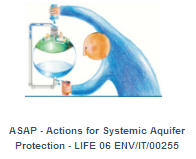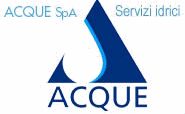Da Wiz-Life+.
| Riga 1: | Riga 1: | ||
| - | The WIZ project | + | The WIZ project specifically addresses the '''integration of future water management conditions with spatial development and planning of the built environment''', by taking the impact of climate change into account.<br> |
Climate change is expected to increase both the frequency and the severity of extremes of heat and drought, rain and flooding. <br> | Climate change is expected to increase both the frequency and the severity of extremes of heat and drought, rain and flooding. <br> | ||
| - | In Europe, | + | In Europe, the impact on drinking water availability is already apparent: water demand has been increasing over the past 17 years and is equal to over 100 million cubic metres(m3) of fresh water per year; however over the last three years only 24, 39, and 19 million m3 have been available respectively. <br> |
| - | + | The reasons include an increase in water temperature and lower river flows that will also affect water quality.<br> | |
| - | Water stress is | + | Water stress is rising in southern Europe and is expected to continue as a result of climate change, increasing tourism, and irrigation (linked to rising temperatures and droughts). |
| - | Indeed, not only climate change, but also urban sprawl is increasing pressure on ecosystems in surrounding areas.<br> | + | Indeed, not only climate change, but also urban sprawl is increasing the pressure on ecosystems in surrounding areas.<br> |
| - | To make matters worse, | + | To make matters worse, from its start in 2008, the financial crisis has progressively substantiated an economic crisis, heavily affecting employment. The building sector, indicated as one of the active branches of the economy, has been supported (in several countries, including Italy and Spain) by new, more favourable state regulations. For local authorities, the chance to restart local economy, attracting capital and creating workplaces through easier procedures for the built environment is appealing. On the other hand, the built environment is associated with an increased demand for drinking water. Consequently, water supply utilities are under pressure to grant new connections to the service without many projection efforts.<br> |
| - | '''We will need to adapt''' — that means assessing our vulnerability and | + | '''We will need to adapt''' — that means assessing our vulnerability and taking steps to lower the risks, not merely controlling the crisis.<br> |
| - | + | ||
| - | + | ||
| - | The overall | + | Continuing the approach that proved successful with the ASAP project - LIFE 06 ENV/IT/000255 - (http://www.klink.it/asap), WIZ partners believe that integrated management, including the reducing and managing of demand instead of simply trying to increase the supply of water, is essential for adaptation (in fact, crisis control is not adaptation). Ultimately, adaptation means reconsidering where and how we live now and in the future. <br> |
| + | An important basic problem is the lack of information for citizens (and businesses), that weakens their full participation to the water governance process. For instance, knowing the available water resources in an area compared to the amount of water used, would add a new perspective to our decision to build/buy a house there. However, better information also needs be integrated into planning and management systems and accepted paradigms, behaviours and practices (institutionalisation).<br> | ||
| + | |||
| + | The overall framework for action for the issues addressed by the WIZ project is provided in the ''Commission's White Paper on Climate Change - (COM (2009) 147 – Adapting to Climate Change: Towards a European Framework for Action)''.<br> | ||
[[Category:Progetto]] | [[Category:Progetto]] | ||
Versione attuale delle 14:16, 22 mar 2011
The WIZ project specifically addresses the integration of future water management conditions with spatial development and planning of the built environment, by taking the impact of climate change into account.
Climate change is expected to increase both the frequency and the severity of extremes of heat and drought, rain and flooding.
In Europe, the impact on drinking water availability is already apparent: water demand has been increasing over the past 17 years and is equal to over 100 million cubic metres(m3) of fresh water per year; however over the last three years only 24, 39, and 19 million m3 have been available respectively.
The reasons include an increase in water temperature and lower river flows that will also affect water quality.
Water stress is rising in southern Europe and is expected to continue as a result of climate change, increasing tourism, and irrigation (linked to rising temperatures and droughts).
Indeed, not only climate change, but also urban sprawl is increasing the pressure on ecosystems in surrounding areas.
To make matters worse, from its start in 2008, the financial crisis has progressively substantiated an economic crisis, heavily affecting employment. The building sector, indicated as one of the active branches of the economy, has been supported (in several countries, including Italy and Spain) by new, more favourable state regulations. For local authorities, the chance to restart local economy, attracting capital and creating workplaces through easier procedures for the built environment is appealing. On the other hand, the built environment is associated with an increased demand for drinking water. Consequently, water supply utilities are under pressure to grant new connections to the service without many projection efforts.
We will need to adapt — that means assessing our vulnerability and taking steps to lower the risks, not merely controlling the crisis.
Continuing the approach that proved successful with the ASAP project - LIFE 06 ENV/IT/000255 - (http://www.klink.it/asap), WIZ partners believe that integrated management, including the reducing and managing of demand instead of simply trying to increase the supply of water, is essential for adaptation (in fact, crisis control is not adaptation). Ultimately, adaptation means reconsidering where and how we live now and in the future.
An important basic problem is the lack of information for citizens (and businesses), that weakens their full participation to the water governance process. For instance, knowing the available water resources in an area compared to the amount of water used, would add a new perspective to our decision to build/buy a house there. However, better information also needs be integrated into planning and management systems and accepted paradigms, behaviours and practices (institutionalisation).
The overall framework for action for the issues addressed by the WIZ project is provided in the Commission's White Paper on Climate Change - (COM (2009) 147 – Adapting to Climate Change: Towards a European Framework for Action).






